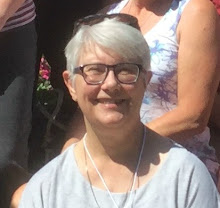My first introduction to the concept of culture and privilege came in grade 6 when the teacher was discussing the colonization of Africa and the 'white man's burden'. He spoke eloquently about the topic, from different angles. Mr. Rae was a pretty amazing person and an incredible teacher.
When I got home I told my mother about the day's lesson and how appalled I was at some of the things he had discussed. I told her that I wished Europeans had stayed in Europe. She got quite huffy and pointed out that if the Europeans had stayed in Europe, I wouldn't exist. I told her that if all it took to prevent all the pain and injustice caused by Europeans in Africa - and elsewhere in the world (hello colonial Canada!) I would be happy to not exist.
My awakening to the extent of my white privilege was slow and I still trip over it. Culture built on a system of inequity becomes a fog we have to cut through in order to see it for what it is. While immersed in the fog, that is our 'normal' and not perceived as the barrier it truly is.
Human beings have been banding together against the 'other' for centuries when in reality, we are all part of the same population. We may have differing degrees of melanin in our skin, but we all stem from the same ancestors. Different groups will determine different approaches to housing and food, largely depending on the environment/climate they live in. But we all have the same needs - food, shelter, companionship.
There is a saying that has been making the rounds: when you have enough, build a bigger table, not a higher wall. As someone raised as a Christian, I see the rightness of this. It aligns with all the Sunday School lessons I learned as I grew up.
Rick Hansen has been an inspiration, with his work on making the urban environment more accessible to people who have issues with mobility. The original 'man in motion' he has done incredible work raising awareness about things like ramps, curb cut outs, doors that are wide enough someone in a wheelchair or using crutches can actually go through.
After my broken ankle my personal experience of a huge reduction in my ability to move through this world was another layer of fog lifted. I was non-weight bearing for 5 weeks, meaning I did not put any weight on my left leg at all. Getting out of my house was do-able - getting back in by myself with the walker was impossible. Crutches were better, but still anxiety provoking on stairs. And my situation was temporary.
Cultural differences are sometimes harder to experience - until you interact with people with a different culture. I grew up in a mix of European backgrounds, but all 'white', all European. My biggest introduction to other cultures when I was young was via books. I read voraciously. I read everything. Science fiction was discovered when I was in grade 6 and allowed to take books from the adult section of the public library - because I'd pretty much read everything in the children's section.
In high school, more great teachers introduced other problematic history - the Crusades. Colonization, not just in Africa, but America, Asia, India etc. Treatment of aboriginal peoples was presented in a factual way that included the mistreatment - the genocide, theft of land, the white man's burden - again. Slavery, in the US but other places, throughout history. An examination of WWII and the Holocaust and other genocides. The 'othering' of people not of your 'tribe'.
At the time, (1960s) Canada was having deep issues over the French/English divide. (Aboriginal rights were still being ignored with original inhabitants of North America being told to give up their culture and language as well as their land, and assimilate - but not ever being treated equitably.)
As an adult I find myself recognizing my privilege in more and more ways. I see the activists working to right at least some of the wrongs against their people. More aboriginal authors are having their books published. If I don't know someone from a different culture in real life, I can at least read their books. It is just a tiny glimpse into their life, but I hope each time I recognize something 'wrong' another chink in my fog will appear and I will see more clearly.
But the first step is recognizing the benefits of the privilege I grew up with. Even though we were not wealthy, rather blue collar 'poor', our lives were not made more difficult just because of the colour of our skin. Then listen to the stories. Learn the history. Figure out how to make things better for everyone. Because we are all human.




No comments:
Post a Comment